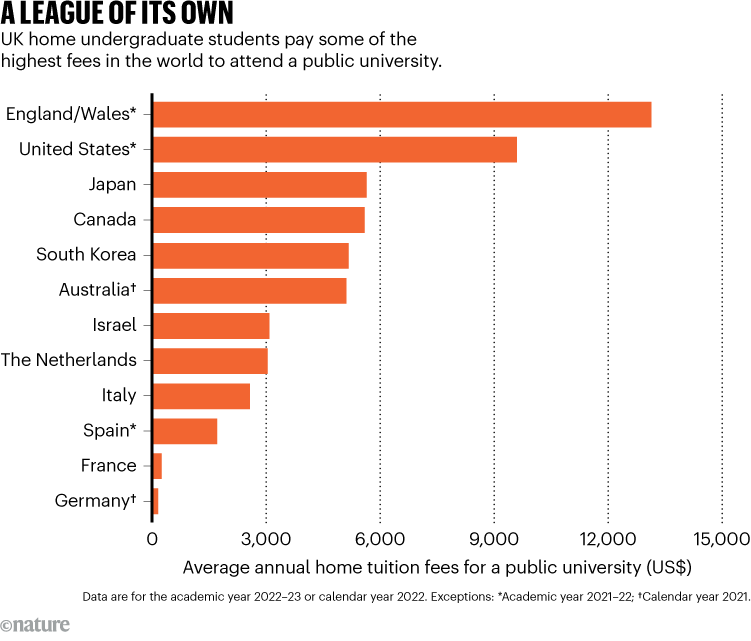Some UK universities might not receive support from the new Labour government, despite their financial struggles.Credit: Christopher Furlong/Getty
There are two stages to going bankrupt, according to a character in the 1926 Ernest Hemingway novel The Sun Also Rises: first gradual, and then sudden. Many UK universities are approaching step two, as Nature reports in a Careers feature. High inflation and frozen student fees have created a perfect financial storm. To add to that, in January, the UK government banned most international students from bringing their dependants into the country. This is further fuelling existing perceptions that the nation is becoming less welcoming, resulting in a marked fall in the students who contribute to balancing the books.
All of this helps to explain why there is a crisis: the state does not directly pay universities in England, Northern Ireland and Wales to teach students, as happens elsewhere. Instead, universities rely heavily on tuition fees for income, with students essentially their paying customers, as if universities were for-profit businesses. Any government typically would let businesses fail if they don’t make a profit. The 11-week-old Labour government of Prime Minister Keir Starmer doesn’t seem inclined to see universities differently to businesses. It should.

UK university departments on the brink as higher-education funding crisis deepens
To be clear, not all UK universities are suffering equally. Older, world-renowned ones, such as the 24 members of the Russell Group of research-intensive universities, are comparatively less at risk, because they have enough longevity and reputation to both secure credit and attract students from abroad, who pay higher fees than home students.
A ‘squeezed middle’ of newer institutions are less fortunate. They are more reliant on home students, whose tuition fees are currently capped at £9,250 (US$12,300) a year in England and Wales and £4,750 in Northern Ireland (Scottish students do not pay to attend universities in Scotland). Many of these institutions have also borrowed heavily to fund buildings to make them more attractive to students and to keep up with their more famous competitors (A. R. Bell et al. Int. Rev. Econ. Finance 82, 771–783; 2022).
Some 108 degree-awarding institutions in England are expected to be in deficit by the end of this year, according to the Office for Students, the English universities regulator. Many of those working in higher education say that soon — very soon — one of these universities will become insolvent. In many cases, the cost of educating a UK undergraduate student is more than the amount the student pays the university.
A bankruptcy would be a disaster. The universities most at risk are among the largest employers in their towns and cities, and more likely to educate students who will be the first in their families to receive higher education, compared with Russell Group universities.

UK’s new science minister on budget battles, Brexit and AI leadership
So far, the government’s message seems to be that universities are on their own. Higher-education leaders must behave like business owners — and face the consequences of the market if they fail.
Labour’s thinking fails an important test. Universities organize much of the nation’s research, which is subject to different financial arrangements from teaching. In 2021, UK taxpayers contributed £12.8 billion (US$17 billion) in funding to researchers, mostly at universities. That subsidy comes partly on the understanding that innovation and technologies emanating from universities push society forward and boost economic growth. A report commissioned by Universities UK, the London-based umbrella body for UK universities, found that every £1 of public investment generates £14 of economic benefit (see go.nature.com/3xztcrf). It makes little sense to treat academic research as a public investment, but higher education as a private-sector industry. If universities can’t educate those who will be the scientists of the future, their research output is going to be severely diminished.
Other countries show that it doesn’t have to be this way (see ‘A league of its own’). Many European governments pump billions into higher-education funding as well as research. Students pay a small charge, or a heavily subsidized tuition fee, to cover the costs of a degree. Government scholarships are also available in many countries. China, which has the world’s largest higher-education sector, with more than half of its secondary-school graduates enrolling in tertiary education, operates on a similar model. Even in the United States, public universities receive some direct funding from their state governments as well as charging tuition fees.

Source: OECD Education at a Glance 2024
The UK government faces a mountain of problems: prisons are overflowing, the National Health Service is in serious trouble and the economy is barely growing. Some say that UK citizens don’t expect public money to be used to save a struggling supermarket or clothing label, so why should a government bail out a struggling university? One alternative being discussed is to allow universities to increase student fees, in exchange for them agreeing to limit international students. That could be the worst of all worlds: it would confirm that the United Kingdom is less welcoming to people from other countries, and subsequent generations of home students would be punished with ever-increasing fees.
Universities are important places for investing in young people; they are a space, often far away from home, where for a few years, the next generation learns independence and agency. Universities — through research, innovation and their role as employers — are also necessary for economic growth, which Labour has committed to boosting. But market success cannot be the only measure if the United Kingdom is to achieve its growth ambitions. The future has to include long-term, stable public investment in universities, too.
